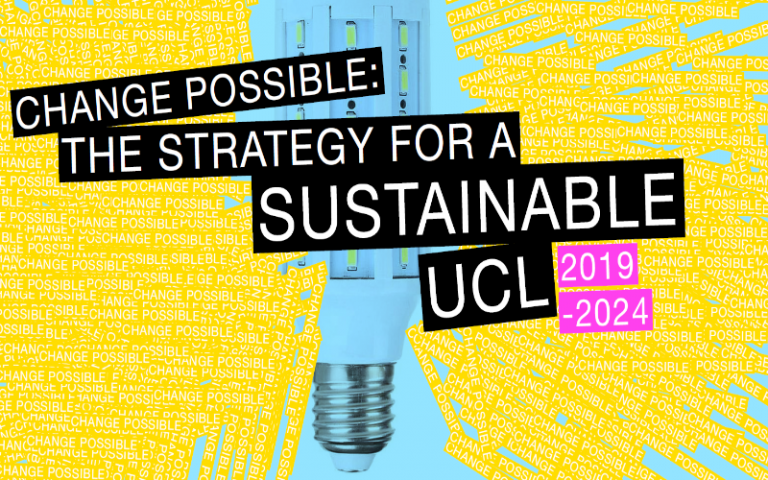UCL divests from fossil fuels as it launches bold new sustainability strategy
16 October 2019
UCL has announced it will divest from fossil fuels by the end of 2019, as the university today launches its bold new sustainability strategy.

The university has committed not to invest in companies involved in fossil fuel extraction or production and will make public its portfolio of investments to be transparent about its investment decisions.
The move comes as UCL sets out its plans to be ever-more active in tackling the global climate emergency whilst deepening its commitment as a leader in environmental and social sustainability.
Among the key measures announced today is a pledge for all UCL buildings to be net zero carbon by 2024 and for our whole institution to be net zero carbon by 2030. Within the next five years, UCL has also committed to create a plastic-free campus and give all of its 42,000 students the opportunity to study and be involved with sustainability.
The new initiatives build on action UCL has previously taken which has seen a 27 per cent reduction in carbon emissions in the last 10 years, becoming a zero-to-landfill university and only commissioning and constructing sustainable buildings.
UCL’s new Student Centre has recently been awarded the BREEAM Outstanding rating – one of only 320 buildings in the world to achieve this status. The university has also risen 71 places in the People and Planet University League in the last five years.
By 2024, UCL has made the following key commitments:
- Every student will have the opportunity to study and be involved in sustainability
- We will increase our sustainability research and increase our focus on the Sustainable Development Goals
- Our buildings will be net zero carbon and by 2030 our institution will be net zero carbon
- We will be a single-use-plastic free campus
- We will reduce waste per person by 20%
- 10,000m2 of more biodiverse green space on campus will be created
As part of the strategy, UCL will also be running three signature campaigns to drive action:
Positive Climate will use UCL’s wealth of climate change expertise and research to reduce carbon emissions. By 2030, key actions include generating all our renewable energy, exploring ways to help our staff and students reduce the impact of their travel and will introduce 100% vegetarian catering for events and hospitality.
The Loop will tackle unsustainable consumption by supporting our local economy and specifying products with the highest environmental and wellbeing standards. By 2021, social environmental and modern slavery audits will be carried out on UCL’s largest suppliers and sustainability ratings will be introduced on products both online and in canteens.
Wild Bloomsbury will introduce nature-based solutions to Bloomsbury by working with Camden and our local partners. By 2024, we will create 10,000m2 extra biodiverse space – the equivalent of around one and a half football pitches. This will include green walls, brown roofs and pocket gardens to increase biodiversity and reduce the impacts of pollution in the heart of London. Other measures include developing an active travel strategy and launching live air pollution monitoring for the UCL campus.
Professor Michael Arthur, UCL President & Provost, said: “As climate change, resource depletion and biodiversity loss becomes critical, the world faces an uncertain future. Universities have a responsibility to lead change for environmental and social sustainability. By being proactive, we can mobilise our staff and students and inspire the next generation of young adults to change the world. By doing so, we will play our part in catalysing the broad changes we need to create a sustainable future for people and planet.”
Professor Geraint Rees, Chair of UCL Sustainability Steering Group, said: “UCL knows that to change the future, we have to show that a sustainable future is possible. The UCL Sustainability Strategy encourages all members of our community to do their part in co-creating a world where everyone can live together within the capacity of the planet. Using UCL’s research, we will make our campus the showcase of how a city-centre global institution can operate within planetary limits.”
Carol Paige, Democracy, Operations and Community Officer, Students’ Union UCL, added: “Both the UCL Sustainability Strategy and our own Union strategy are aligned in their work towards a sustainable future. We aspire to be the most sustainable Students’ Union in the world and we’re excited to take on this challenge in partnership with UCL.”
The launch of UCL’s sustainability strategy will also be celebrated by physicist and oceanographer Dr Helen Czerski (UCL Mechanical Engineering), as part of the 'Climate Change: Time for Change' debate to be held at UCL’s Bloomsbury Theatre on Wednesday October 30, 2019. Dr Czerski will be joined by leading UCL researchers and student activists, to discuss the climate emergency and answer questions from the audience.
Links
- UCL sustainability strategy
- UCL Sustainability Team
- UCL Student Centre BREEAM rating
- 'Climate Change: Time for Change' debate with Dr Helen Czerski
- UCL Council
Media contact
Henry Killworth
Tel: + 44 (0) 207 679 5296
E: h.killworth [at] ucl.ac.uk
 Close
Close

